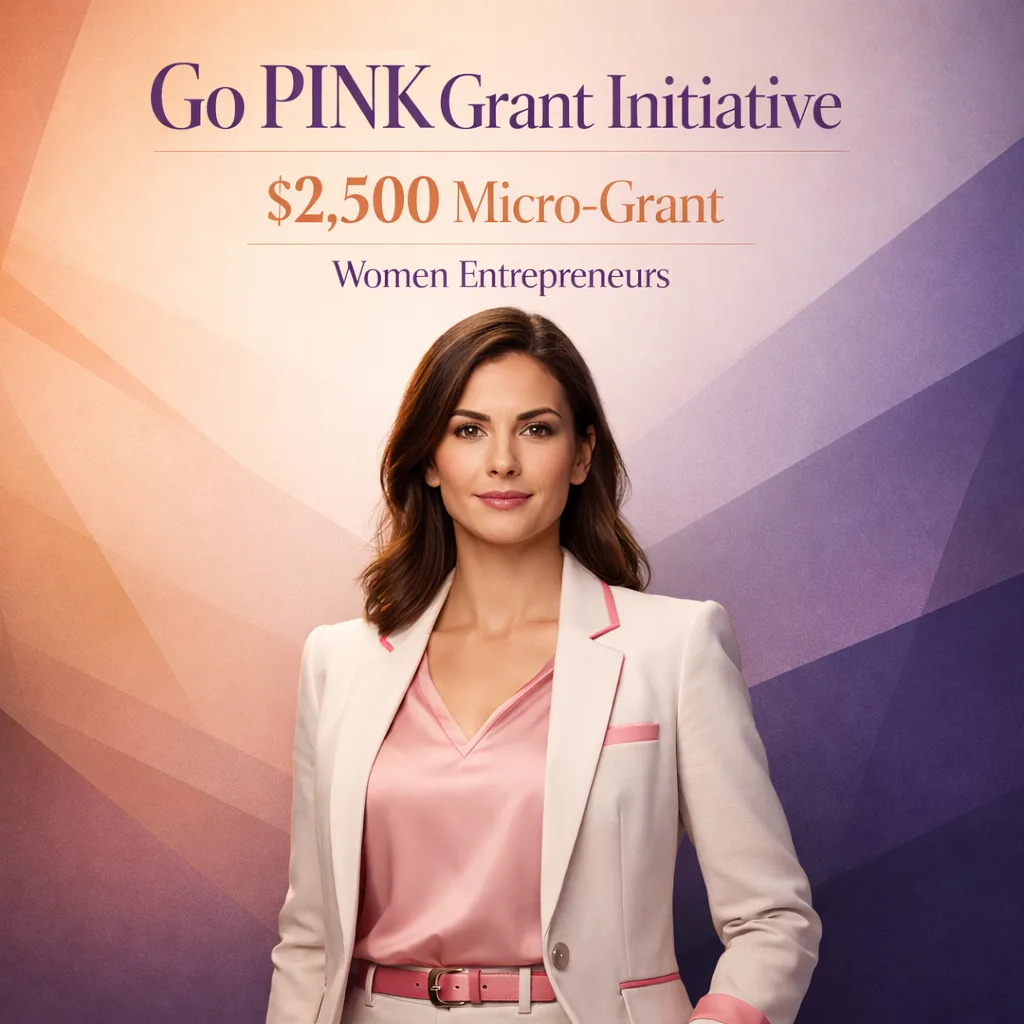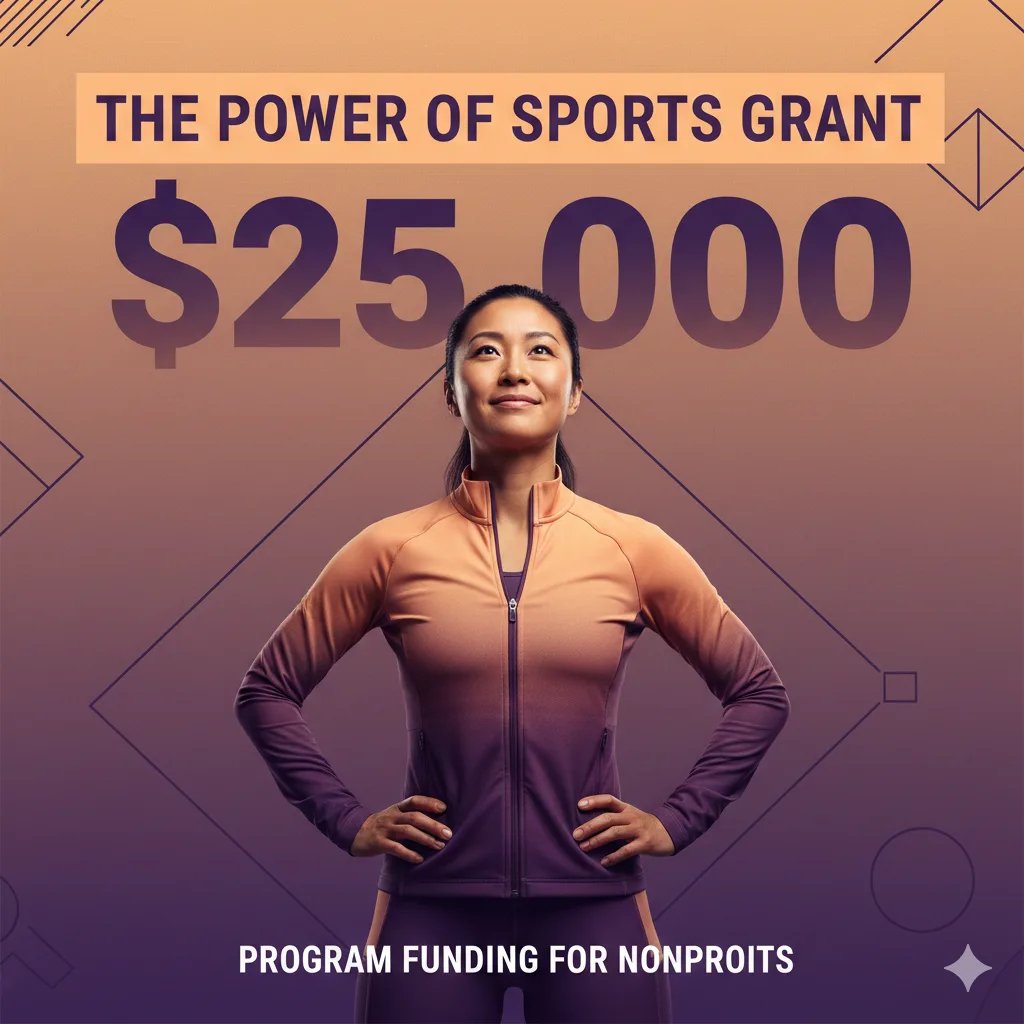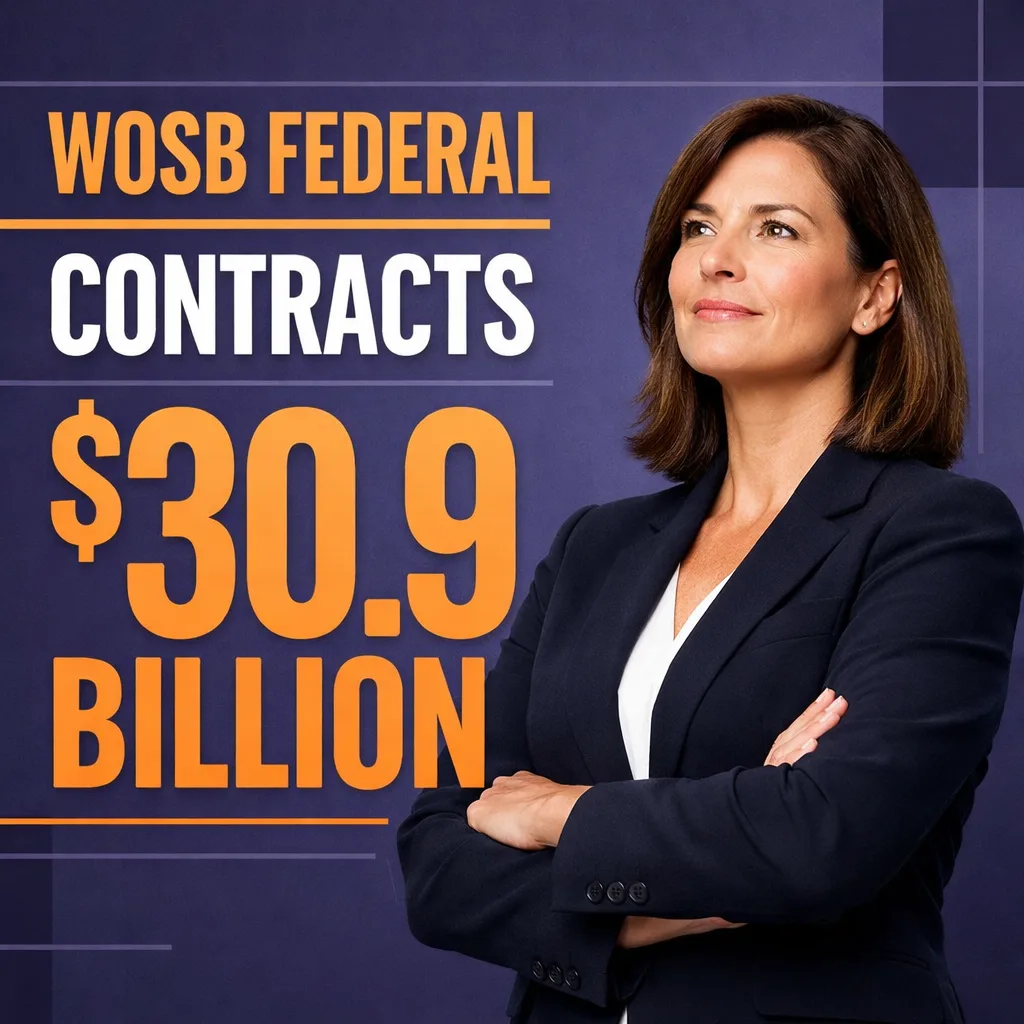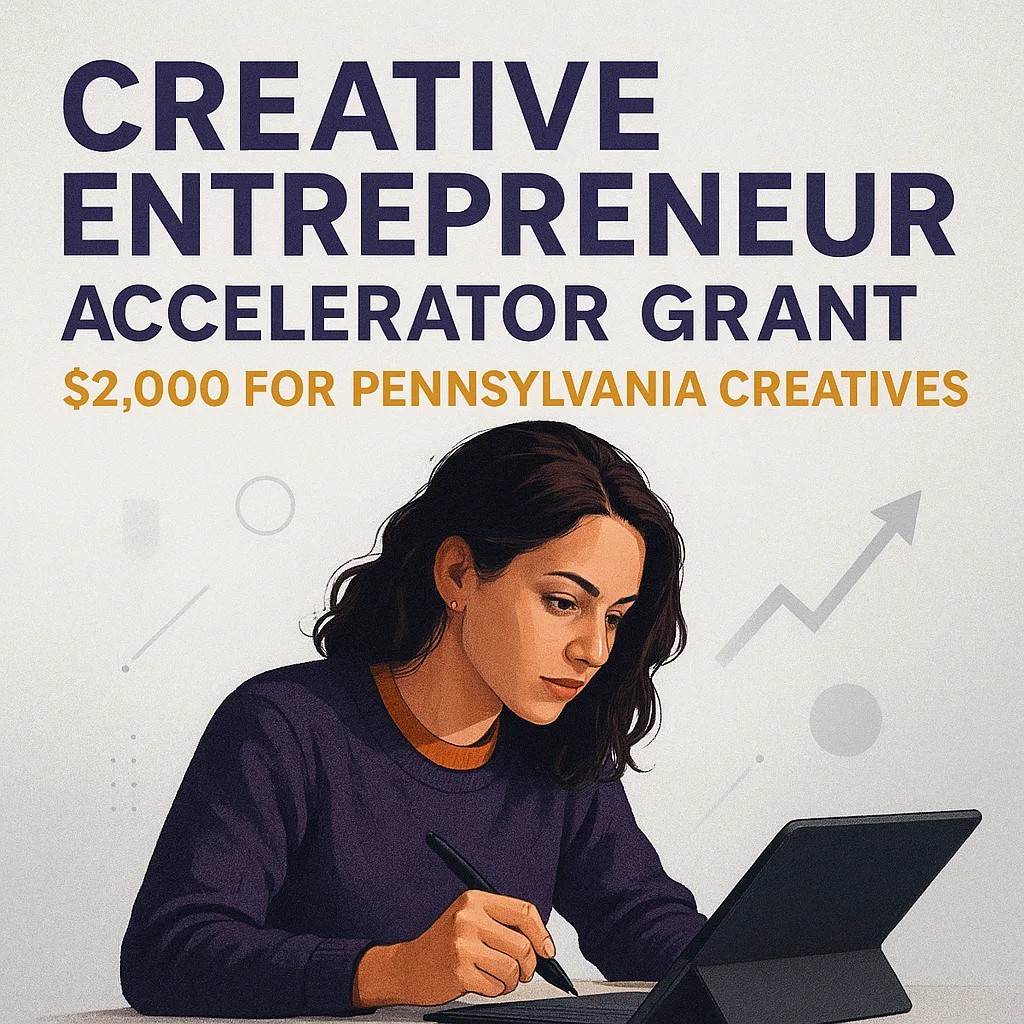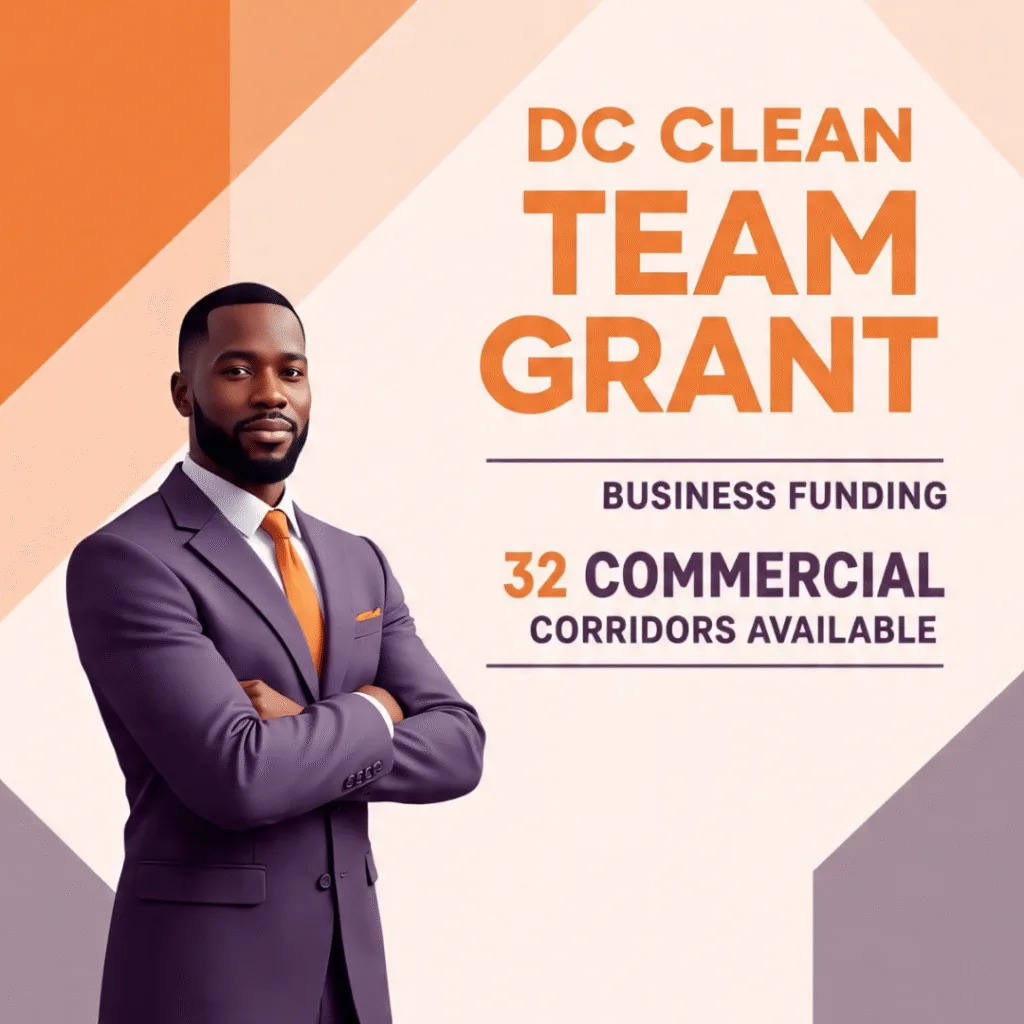
Fiscal Year 2026 Clean Team Grant Program: $4.5M Business Funding Opportunity for DC Commercial Corridor Enhancement
Washington DC nonprofits and local businesses can secure up to $430,490 in business funding to transform commercial corridors.
Grant Overview
Washington DC nonprofits and local businesses can secure up to $430,490 in business funding to transform commercial corridors through comprehensive cleaning and maintenance services
The Fiscal Year 2026 Clean Team Grant Program represents one of Washington DC’s most substantial business funding opportunities, offering grants from $100,000 to $430,490 for qualified operators across 32 commercial corridors. This DSLBD initiative transforms neighborhood aesthetics while generating reliable revenue streams for nonprofits and certified business enterprises willing to tackle street cleaning, graffiti removal, and public space maintenance.
The beauty of this program lies in its simplicity and direct impact. Clean Team operators become the backbone of their assigned commercial areas, providing essential services that everyone can see and appreciate. Think about it – when was the last time you walked down a clean, well-maintained commercial street and didn’t feel better about being there? That’s the magic these teams create, and now’s your chance to lead that transformation while securing substantial business funding for your business or organization.
But here’s where most applicants stumble: they treat this like a typical grant application rather than understanding it’s a competitive service contract requiring operational expertise, DC resident hiring commitments, and detailed budget justification. The funding amounts vary dramatically by corridor complexity, from Wisconsin Avenue’s $203,178 to Lower Georgia Avenue’s impressive $430,490.
Donor: Department of Small and Local Business Development (DSLBD)
Focus: commercial corridor maintenance, public space cleaning, business funding, DC economic development, community improvement
Region: Washington DC, District of Columbia, specifically designated commercial corridors across all wards
Eligibility:
– Nonprofit organizations incorporated in Washington DC
– OR businesses registered with DSLBD as Certified Business Enterprises (CBE)
– Must be current on all DC business licenses, permits, and taxes
– Principal office must be physically located in the District of Columbia
– No suspension from any District grant program in the past five years
Benefits:
– Financial Award: $110,160.18 to $430,490.50 per service area (depending on location)
– Opportunity to create jobs for DC residents
– Ability to make visible impact in commercial corridors
– Monthly payment structure for operational sustainability
Deadline: September 8, 2025, 2:00 PM (ET)
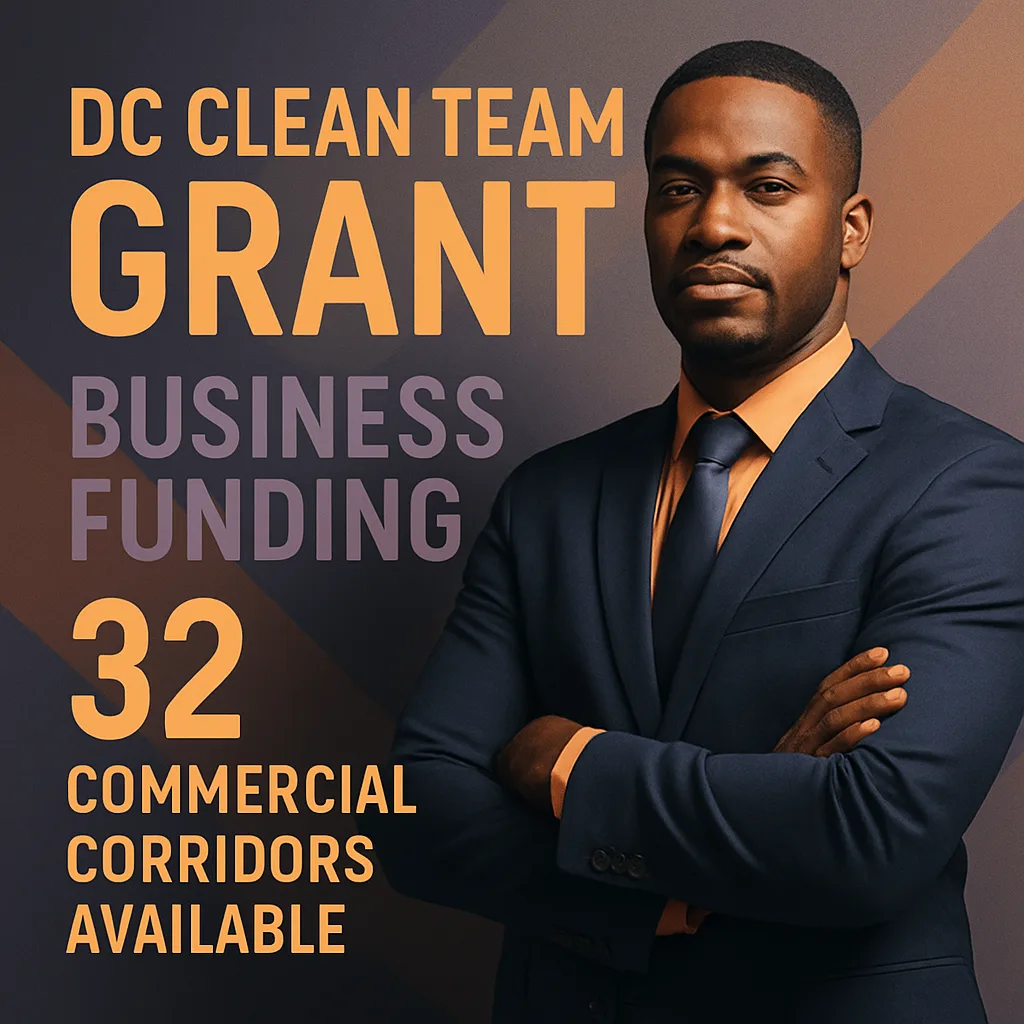
Why does this business funding opportunity exist? Commercial corridors across DC struggle with cleanliness issues that drive away foot traffic. When sidewalks pile up with litter, when graffiti covers storefronts, when tree boxes turn into weed patches, customers walk faster or shop elsewhere.
The economic impact is real. Studies consistently show that clean, well-maintained commercial areas generate higher sales for businesses. DSLBD recognized this connection and created a funding mechanism that solves two problems simultaneously: providing business funding for service operators while improving conditions that boost revenue for corridor businesses.
What makes this business funding opportunity particularly compelling is its dual focus on community improvement and economic development. The Clean Team Grant Program isn’t just handing out money – it’s investing in organizations that can deliver tangible results. The program’s structure ensures that funded operators become integral parts of their commercial corridors, working alongside the Department of Public Works to supplement essential services.
The Money: Understanding Grant Amounts by Service Area
Each corridor receives a specific funding allocation based on square footage, complexity, and service requirements. Lower Georgia Avenue commands the highest funding at $430,490, covering Georgia Avenue from Florida Avenue to New Hampshire Avenue plus surrounding blocks. This reflects the area’s density and the extensive cleaning requirements.
Mid-sized allocations range from $200,000 to $300,000 for areas like Ward 1 ($414,733), Ward 5 Roving ($381,168), and Ward 8 Roving ($311,168). These roving positions cover entire wards, requiring mobile crews and comprehensive coverage strategies.
Smaller corridors still offer substantial business funding. Eastern Market’s $141,030 covers the concentrated area around 7th Street and Pennsylvania Avenue. Ivy City’s $142,050 focuses on the triangle formed by Mount Olivet Road, Trinidad Avenue, and surrounding streets.
What Your Money Must Cover
Grant funds support wages (minimum $18.50 per hour for crew members), equipment purchases, uniforms, fuel costs, vehicle maintenance, and mulching supplies. The funding covers power washing equipment, gum removal tools, and storage facilities.
Nonprofits can claim a 10% indirect rate on the total award amount. This covers administrative overhead, accounting support, and management costs that don’t directly touch the street but keep operations running smoothly.
What They’re Really Looking For
DSLBD wants partners who understand that clean streets are just the beginning. They’re seeking organizations that can build sustainable operations while creating employment opportunities for DC residents. The emphasis on hiring locally and paying at least $18.50 per hour shows this program’s commitment to community development, not just cleanliness.
Think about it this way – you’re not just applying for a grant to clean streets. You’re proposing to become a vital community asset that improves quality of life, supports local businesses through increased foot traffic, and provides good jobs. That’s a powerful combination that resonates strongly with the program’s evaluators.
The Real Story Behind This Initiative
This program didn’t materialize out of thin air. It’s part of a broader strategy by the DC government to revitalize commercial corridors and create more vibrant neighborhoods across the District. The funding levels – some reaching nearly half a million dollars – reflect how seriously the city takes this initiative.
Past Clean Team operators have transformed struggling commercial areas into thriving destinations. Take the Ward 1 Clean Team, for instance, which received over $414,000 in funding to maintain the bustling 14th Street corridor, Mount Pleasant Street, and surrounding areas. These teams don’t just clean – they become part of the neighborhood’s identity.
Q: Can for-profit businesses apply for this grant?
A: Yes, but only if they’re registered as Certified Business Enterprises (CBE) with DSLBD.
Q: How many crew members do we need to hire?
A: You must maintain at least one crew member presence during scheduled hours, but most successful teams employ multiple workers to cover their service areas effectively.
Q: What happens to the grant money if we don’t spend it all?
A: You’ll need to provide an explanation and return any unspent funds at the end of the performance period.
The Real Challenge: Hiring and Retaining DC Residents
Every Clean Team operator must hire DC residents as crew members. This isn’t just a preference, it’s a hard requirement that determines your eligibility. At $18.50 per hour minimum wage, you’re competing with other employers for reliable workers who can handle outdoor physical labor in all weather conditions.
Successful applicants develop recruitment strategies that tap into community networks. Community-focused business funding programs often share similar workforce development challenges, requiring deep neighborhood connections and competitive compensation packages.
The retention aspect proves equally crucial. Street cleaning work is physically demanding. Summer heat, winter snow, and daily exposure to urban debris test worker commitment. Operators who win these awards typically offer additional benefits beyond the minimum wage requirement, including health insurance, paid time off, or performance bonuses.
Staffing Requirements That Make or Break Applications
Your corridor must maintain at least one crew member during all scheduled hours. Larger areas like Ward 1 or Lower Georgia Avenue require multiple crew members working simultaneously. The review panel examines your staffing calculations carefully, comparing proposed coverage against corridor size and service requirements.
Q: How many crew members do I need for my corridor?
A: Varies by area size and service intensity. Small corridors like Friendship Heights might need 2-3 crew members total, while Lower Georgia Avenue could require 8-12 crew members working in shifts.
Q: Can I subcontract the work to another company?
A: Yes, but your subcontractor must also hire DC residents and meet all insurance requirements. DSLBD must approve all subcontracting arrangements.
Q: What happens if I can’t find enough DC residents to hire?
A: Your grant could be terminated. The DC resident hiring requirement is non-negotiable and monitored throughout the contract period.
Services You’ll Actually Perform
– Clean Team operators handle seven core responsibilities that supplement DC’s Department of Public Works. Public space maintenance involves removing trash and debris from sidewalks, curblines, and tree pits using sweeping and manual collection methods. You’re not just picking up obvious litter; you’re detailed cleaning that creates inviting pedestrian environments.
– Litter removal extends beyond surface cleaning. Teams empty DPW litter cans and transport collected materials to designated trash transfer stations. This requires vehicle access and coordination with municipal waste management schedules.
– Graffiti and sticker abatement demands immediate response capabilities. Fresh graffiti gets removed quickly before it attracts additional vandalism. Illegal poster removal keeps community bulletin areas clean and legal postings visible.
– Snow and ice removal becomes critical during winter months. DC winters can shut down foot traffic entirely when sidewalks become hazardous. Clean Teams maintain pedestrian access during weather events that would otherwise empty commercial corridors.
– Rree box mulching happens annually but requires timing and material sourcing. Properly mulched tree boxes prevent weed growth and improve the aesthetic appeal of commercial streets. Weeding extends to sidewalks, curbs, and tree boxes where vegetation creates maintenance issues.
– Reporting public space defects to DC 311 connects Clean Teams to the broader municipal maintenance system. Teams identify potholes, broken streetlights, damaged signage, and infrastructure problems that individual businesses might ignore but collectively impact corridor appeal.
What Past Winners Did Right
Historical Clean Team operators succeeded by treating this as a customer service business, not just a cleaning contract. The best teams develop relationships with corridor businesses, understanding peak hours, special events, and seasonal challenges specific to their assigned area.
Women-owned business funding recipients often excel at community engagement aspects that make Clean Team operations successful. They build trust with business owners, coordinate around delivery schedules, and maintain professional appearances that reflect positively on the entire corridor.
Application Strategy: The Two-Phase Process
The FY2026 application process splits into eligibility determination and competitive application phases. Eligibility applications open August 18, 2025, closing August 25, 2025. Only qualified applicants receive invitations to submit competitive applications between August 28 and September 8, 2025.
This two-phase structure eliminates unqualified applicants early, reducing competition for serious contenders. However, it also means documentation errors during eligibility review eliminate you completely, regardless of your operational capabilities.
Eligibility requires active DC business license, corporate registration in good standing, Certificate of Clean Hands from DC Office of Tax and Revenue, current tax identification number, signed W-9 form, and financial statements including organizational budget, income statement, and balance sheet.
Nonprofits additionally submit IRS 501(c)(3) determination letters and board rosters. All applicants provide three years of tax returns or IRS Form 990 filings plus required attestations covering DC resident hiring commitment and anti-collusion certifications.
Q: Can I apply for multiple corridors?
A: Yes, but each corridor requires a separate complete application with specific service area analysis and corridor-focused operational planning.
Q: What insurance coverage do I need?
A: General liability ($1M occurrence, $2M aggregate), workers compensation, cyber liability ($1M), and auto insurance ($1M) if you own vehicles.
Q: When do I find out if I won?
A: DSLBD notifies awardees around September 20, 2025, with service beginning October 1, 2025.
Competitive Application Scoring: The 100-Point System
Review panels evaluate applications across four 25-point sections. Organizational expertise examines your relevant experience, capacity to deliver services, and competitive advantages over other applicants. Implementation strategy covers DC resident recruitment plans, understanding of daily operations, and readiness to begin October 1st service.
Grant utilization and operational planning scrutinizes staffing numbers, work schedules, crew deployment, and subcontracting arrangements. Budget evaluation determines whether your proposed expenses align with service requirements and demonstrate efficient use of taxpayer funds.
The highest-scoring applications provide detailed operational narratives specific to their chosen corridor. Generic responses that could apply to any service area typically score poorly. Review panels want evidence you’ve walked the area, identified specific challenges, and developed targeted solutions.
Budget Mistakes That Kill Applications
Common budget errors include underestimating labor costs, overestimating equipment expenses, and failing to account for seasonal variations. Winter operations cost more due to snow removal requirements. Summer operations face higher labor costs due to heat-related productivity challenges.
Successful budgets demonstrate understanding of actual operational costs. They include realistic wage calculations, equipment replacement schedules, and contingency planning for unexpected expenses. Business development funding applications often face similar budget scrutiny, requiring detailed cost justification and operational feasibility.
Service Area Analysis: Choosing Your Corridor Wisely
Each corridor presents unique operational challenges and opportunities. Connecticut Avenue covers multiple disconnected segments in Woodley Park, Cleveland Park, Van Ness, and Chevy Chase, requiring efficient transportation between areas and understanding of diverse neighborhood dynamics.
Georgia Avenue corridors split between south (Lower Georgia Avenue at $430,490) and north (Upper Georgia Avenue at $220,240). The southern section includes U Street’s nightlife district with weekend cleanup challenges, while the northern section extends to the District border with more residential cleaning needs.
Ward-based roving positions offer flexibility but require comprehensive coverage strategies. Ward 5 Roving ($381,168) covers all commercial areas within the ward, demanding mobile crews and responsive scheduling to address varying cleanliness needs across different business districts.
Q: Which corridor offers the best return on investment?
A: Depends on your operational capacity. Higher-funded corridors like Lower Georgia Avenue require larger crews and more complex logistics.
Q: Can I change corridors after I’m awarded?
A: No. Your grant agreement specifies exact service boundaries that cannot be modified without DSLBD approval.
Common Mistakes to Avoid
Many applicants stumble by focusing too much on the cleaning aspects and not enough on the community impact. Remember, this is business funding with a purpose – evaluators want to see how you’ll engage with the community, create jobs, and contribute to the broader economic development goals of your corridor.
Another frequent error is underestimating the reporting requirements. Monthly expense and workload reports aren’t optional – they’re essential components of the program. Make sure you have systems in place to track these metrics before you apply.
The Application Timeline You Need to Know
Mark these dates in your calendar if you’re serious about this opportunity:
– August 18, 2025 (2:00 PM ET): Eligibility Application Opens
– August 25, 2025 (2:00 PM ET): Eligibility Application Closes
– August 28, 2025: Competitive Application Opens (for eligible applicants only)
– September 5, 2025 (2:00 PM ET): Last day to submit questions via email
– September 8, 2025 (2:00 PM ET): Competitive Application Closes
– September 20, 2025: Awardees Notified (Tentative)
This timeline shows there’s no room for procrastination. The eligibility determination happens first, and only those who make it through get to submit the full competitive application. Smart applicants start gathering their documentation well before the August 18 opening date.
What Makes a Winning Application?
The difference between success and failure often comes down to how well you understand your proposed service area. Don’t just talk about cleaning – talk about the specific challenges and opportunities in your corridor. What are the pain points local businesses mention? Where do residents see the most need for improvement?
Your staffing plan needs particular attention too. How will you recruit and retain DC residents? What training will you provide? How will you ensure consistent coverage across your service area? These details show evaluators you’ve thought through the operational realities, not just the aspirational goals.
The Financial Reality Check
Let’s be real about the money. These grants range from about $110K to over $430K, but they need to cover wages, equipment, supplies, insurance, and all operational costs for an entire year. The requirement to pay at least $18.50 per hour means labor costs alone will be substantial.
Successful applicants create detailed budgets that account for every expense category while leaving room for unexpected costs. They also understand that this is reimbursement-based funding – you’ll need to spend first, then get reimbursed through proper documentation.
Beyond the Basics: What Really Sets Winners Apart
The most competitive applications go beyond the minimum requirements. They demonstrate deep community connections, innovative approaches to resident hiring, and creative solutions to persistent corridor challenges. Some successful applicants have partnered with local workforce development programs to create pipelines for hiring DC residents. Others have developed unique approaches to engaging local businesses in the cleaning process.
Think about what makes your approach special. Do you have existing relationships in the community? Have you developed more efficient cleaning methods? Can you offer additional services that complement the basic requirements? These differentiators matter when you’re competing for substantial business funding like this.
Life After Winning: What to Expect
If you’re selected, the real work begins. You’ll need to execute a grant agreement, maintain proper insurance coverage, and start operations by October 1, 2025. The monthly reporting requirements mean you’ll need robust systems for tracking both expenses and work completed.
But the rewards extend beyond the funding itself. Clean Team operators become respected community partners. They build relationships with local businesses, residents, and city agencies. Many find that the visibility and credibility gained through this program lead to additional opportunities and contracts.
Is This the Right Opportunity for You?
This business funding opportunity isn’t for everyone. It requires significant operational capacity, experience managing teams, and the ability to navigate government requirements. But if you have the infrastructure and community connections, it represents one of the most substantial and impactful funding opportunities available in DC.
Consider your organization’s strengths honestly. Do you have experience with similar services? Can you manage the scale of operations required? Are you prepared for the administrative responsibilities that come with government funding? Answering these questions truthfully will help you decide whether to invest the considerable time and effort required for a competitive application.
Check Your Eligibility
This interactive tool helps you quickly determine if your organization qualifies for the Clean Team Grant Program. Answer a few simple questions about your business structure, location, and certification status to get instant feedback on your eligibility. If you qualify, you’ll be directed to an assessment form where our experts can help evaluate your readiness for this significant business funding opportunity.
18 More Business Funding Grants
- Square Cornerstone Grant: $10K Business Funding: The Cornerstone Grant offers $10,000 in business funding plus mentorship and visibility to US small businesses using Square, helping overcome funding barriers for entrepreneurs looking to grow their operations.
- Sky’s the Limit Business Grant: $2500 Monthly Funding: Monthly $2500 business funding grants for underrepresented entrepreneurs in US, Canada & UK, providing consistent financial support for businesses needing regular capital infusions.
- BizConnect Small Business Funding: $5K Grant + Mentorship: Get $5000 in small business funding plus expert mentorship through BizConnect, designed specifically for distressed businesses needing both capital and guidance.
- Secretsos™ Small Business Grants USA $2500 Funding: Quarterly $2500 business funding grants USA for underserved entrepreneurs with no business plan required and complete spending flexibility for maximum impact.
- Idea Cafe Small Business Grant: Empowering women entrepreneurs, this grant provides financial support for innovative ventures, fostering growth and diversity in the small business funding landscape.
- Hey Helen Grant: $5,000 for Women-Owned Mission-Driven Businesses: Female founders with proven, impactful ventures can access this business funding without the operational complexity of service contracts. Applications focus on business impact rather than municipal service delivery.
- Galaxy Grant for Women & Minority Entrepreneurs: Monthly $2,450 awards plus luxury vehicle prizes specifically target minority and women business owners seeking growth capital for established operations.
- She’s Connected Grant: $50k for Small Businesses: Offering $50,000 in business funding specifically designed to support women entrepreneurs across the United States and Washington DC, helping bridge the funding gap.
- HoneyBook $5000 Grant: This business funding grant is specifically designed for independent business owners in the U.S. and Canada, providing $5000 to help entrepreneurs scale their operations.
- $20K Allstate Grants + Business Accelerator Program: Get $20000 in business funding plus a 12-week business accelerator program, combining financial support with comprehensive business education for sustainable growth.
- Nehemiah Davis $2.5k Greatness Grant: Fast-track your startup dream with $2.5k in business funding, mentorship, and access to a community of driven entrepreneurs throughout the United States.
- Awesome Foundation Grants For Small Businesses: Monthly $1000 business funding grants for global changemakers, providing consistent, accessible funding for innovative ideas and social enterprises.
- Wish Local Empowerment Program: $500 to $2,000 business funding targeting Black-owned brick-and-mortar businesses with 20 or fewer employees, supporting community commerce and economic development.
- Modest Needs Self-Sufficiency Grants: Emergency financial assistance for working individuals and families, providing bridge funding during unexpected financial crises that threaten business operations.
- Business & Enterprise Grants: Discover comprehensive business funding opportunities for companies of all sizes, from startups to established enterprises seeking capital for growth and innovation.
- Non-Profit Organization Grants: Access specialized grants for non-profit organizations focused on creating social impact, including business funding for community development projects like the Clean Team initiative.
- Washington DC Grants: Complete directory of local business funding opportunities including DSLBD programs, federal initiatives, and private foundation grants available to DC-based organizations.
- ZenBusiness Grant Program: $5,000 business funding for recently formed companies that used ZenBusiness formation services, targeting early-stage operational support and growth initiatives.
Finding the right business funding opportunity can make all the difference for your organization’s growth and impact. Grantaura’s comprehensive database is updated daily with new grants, ensuring you never miss out on opportunities that could transform your business or nonprofit. Our platform makes business funding accessible by bringing together hundreds of opportunities in one place, saving you countless hours of research and increasing your chances of securing the capital you need to succeed.
Terms
- Business Funding: Financial support provided to organizations to help them start, grow, or maintain operations. In the context of the Clean Team Grant, this refers to the substantial financial awards ranging from $110K to over $430K provided to successful applicants.
- Certified Business Enterprise (CBE): A for-profit business headquartered in the District of Columbia and certified by DSLBD, giving preference in procurement opportunities including this business funding program.
- Commercial Corridor: A concentrated area of commercial activity, typically along a major street, where businesses are clustered together. The Clean Team Grant focuses on improving these areas throughout Washington DC.
- Period of Performance: The timeframe during which grant-funded activities must be completed, running from grant agreement execution through September 30, 2026 for this business funding opportunity.
- Public Space Maintenance: The core service required under this grant, including removal of trash and debris, emptying litter cans, graffiti removal, and reporting public space defects to DC 311.
- Request for Applications (RFA): The formal document outlining all requirements, procedures, and evaluation criteria for the business funding opportunity, providing comprehensive guidance to applicants.
- Service Area: The specific geographic boundaries within Washington DC where each Clean Team operator will provide services, with 32 distinct areas available under this business funding program.
- Notice of Funding Availability (NOFA): The official announcement that business funding is available, containing basic information about the grant opportunity and directing applicants to the full RFA.
- Eligibility Determination: The initial review process where DSLBD assesses whether applicants meet basic qualifications before allowing them to proceed to the full competitive application for business funding.
- Competitive Application: The detailed application process that only eligible applicants can access, requiring comprehensive proposals about how they’ll use the business funding to achieve program objectives.
- Monthly Workload Reports: Required documentation showing the quantity and type of services performed, essential for maintaining compliance with this business funding program.
- Monthly Expense Reports: Financial documentation required from grant recipients, tracking how the business funding is being spent and ensuring proper use of grant funds.
- Statement of Certification: A formal document where applicants attest to their eligibility and compliance with all program requirements, a critical component of the business funding application process.
- Grant Agreement: The legally binding contract between DSLBD and the successful applicant, outlining all terms, conditions, and requirements for receiving and using the business funding.
- Pre-Award Requirements: Documentation and steps that must be completed before receiving business funding, including insurance verification, registration in financial systems, and submission of various certifications.
- DC Resident: An individual who lives in the District of Columbia, whom Clean Team operators must prioritize hiring as part of this business funding program’s community focus.
- Core Web Vitals: Performance metrics for websites, though in this context, it relates to the essential services that Clean Teams must provide as part of their business funding agreement.
- Final Report Requirements: Documentation that must be submitted at the end of the funding period, detailing outcomes achieved and funds expended, completing the business funding cycle.
Author
Imran Ahmad understands the challenges businesses face when seeking funding opportunities in Washington DC. Having worked with over 300 clients through his grant writing expertise on Fiverr since 2021, he’s seen firsthand how the right business funding can transform organizations and communities. The Clean Team Grant Program particularly resonates with him because it represents exactly what Grantaura stands for – making funding accessible while creating tangible community impact.
When Imran founded Grantaura, his mission was to bridge the gap between complex funding opportunities and the organizations that need them most. This grant embodies that perfectly, offering substantial financial support while requiring real operational capability and community commitment.
Don’t Miss Your Next
Funding Opportunity
How to apply for this grant
We are your trusted grant application partners. You can navigate the entire grant application process with our expert guidance through this simple 5-step process.
Step 1: Application Form
Fill out the “Apply for this grant” form with your information and grant requirements.
Step 2: Eligibility Assessment
Our grant experts will assess your eligibility and notify you via email.
Step 3: Expert Consultation
A dedicated grant expert will be assigned to discuss next steps for your application.
Step 4: Application Submission
Our expert will help you complete and submit your application with all required materials.
Step 5: Final Decision
The grant committee will make their decision and notify successful applicants.



